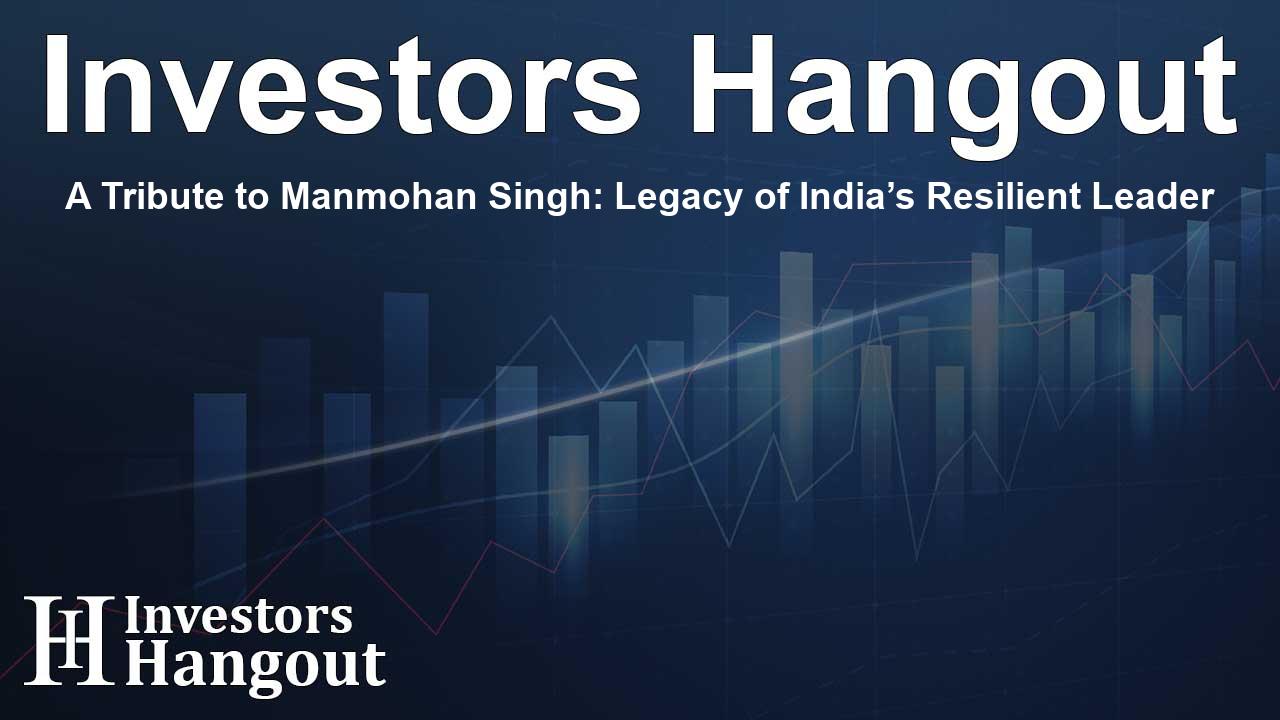A Tribute to Manmohan Singh: Legacy of India’s Resilient Leader

Remembering Manmohan Singh: A Pillar of Indian Leadership
Manmohan Singh, the esteemed former Prime Minister of India, passed away at the age of 92, leaving behind a profound legacy that shaped the nation's economic landscape. Known for his gentle demeanor and relentless dedication to public service, Singh served as Prime Minister from 2004 to 2014, achieving unprecedented milestones during his leadership.
Early Life and Education
Born into modest circumstances in what is now Pakistan, Singh faced numerous challenges from a young age. His commitment to education shone through as he persevered to study by candlelight, ultimately gaining admission to prestigious institutions like Cambridge and Oxford. Completing his doctorate with a thesis on exports and free trade in India’s economy, he established himself as a leading economist.
Transition to Politics
Singh's entry into politics was unexpected, primarily when he was appointed as the Finance Minister in 1991 during a crucial economic crisis. His innovative policies and reforms were pivotal in rescuing India's economy from a precarious position, as he championed deregulation and welcomed foreign investment, which significantly shifted the country's economic paradigm.
The Prime Ministership Era
His ascension to Prime Minister in 2004 was facilitated by Sonia Gandhi, the leader of the Congress Party, who wished to avoid scrutiny due to her Italian heritage. Under Singh’s leadership, India flourished, marking a golden era characterized by remarkable economic growth. His administration aimed to distribute the fruits of this growth across society, which included introducing essential welfare initiatives for the rural population.
Significant Achievements
One of Singh's landmark accomplishments was brokering a pivotal nuclear deal with the United States in 2008, which not only bolstered India's energy security but also strengthened diplomatic ties between the two nations. His government’s efforts to steer the Indian economy through global challenges highlighted Singh's strategic acumen and commitment to national progress.
Challenges During Tenure
While Singh's tenure was marked by significant economic achievements, it was also confronted with substantial challenges. Political disagreements within his coalition government often hampered his ability to implement crucial reforms. Additionally, growing scrutiny and scandal accusations undermined public confidence in his administration.
Facing Political Opposition
Despite earning respect on the global stage, Singh grappled with the narrative in India that suggested he was a puppet leader under the shadow of Sonia Gandhi. His government faced mounting pressure, particularly during the latter part of his tenure when public dissatisfaction soared amid allegations of corruption and delays in decision-making.
Final Years and Enduring Legacy
In the aftermath of Singh's administration, the political landscape shifted significantly when the Bharatiya Janata Party (BJP) gained a decisive victory in 2014. Singh continued to express his pride in serving the nation, often mentioning that he believed history would view him more kindly than contemporary accounts had suggested. His influence and the policies he laid down remain foundational in discussions about India’s economic development.
Personal Reflections
Throughout his life, Manmohan Singh was known for his integrity and simplicity. He is survived by his wife and three daughters, who will carry on his legacy of service and dedication. Singh's journey from a boy studying by candlelight to the halls of power serves as an inspiring tale of perseverance, intellect, and unwavering commitment to a better India.
Frequently Asked Questions
What were Manmohan Singh's major contributions as Prime Minister?
He is widely credited with liberalizing the Indian economy, implementing significant economic reforms, and enhancing India’s global standing.
What challenges did Singh face during his leadership?
His government confronted political instability, allegations of corruption, and public dissatisfaction amid a challenging economic environment.
How did Singh's education influence his career?
His prestigious education and expertise in economics laid the groundwork for his transformative policies as Finance Minister and Prime Minister.
What is Singh's legacy in modern India?
Singh's legacy is marked by economic reforms, globalization, and social welfare initiatives that significantly impacted millions of lives across the nation.
Is Singh considered a significant leader in Indian history?
Yes, Singh is recognized as one of India's most influential leaders, especially for his role in steering the nation through economic transformation.
About The Author
Contact Dominic Sanders privately here. Or send an email with ATTN: Dominic Sanders as the subject to contact@investorshangout.com.
About Investors Hangout
Investors Hangout is a leading online stock forum for financial discussion and learning, offering a wide range of free tools and resources. It draws in traders of all levels, who exchange market knowledge, investigate trading tactics, and keep an eye on industry developments in real time. Featuring financial articles, stock message boards, quotes, charts, company profiles, and live news updates. Through cooperative learning and a wealth of informational resources, it helps users from novices creating their first portfolios to experts honing their techniques. Join Investors Hangout today: https://investorshangout.com/
The content of this article is based on factual, publicly available information and does not represent legal, financial, or investment advice. Investors Hangout does not offer financial advice, and the author is not a licensed financial advisor. Consult a qualified advisor before making any financial or investment decisions based on this article. This article should not be considered advice to purchase, sell, or hold any securities or other investments. If any of the material provided here is inaccurate, please contact us for corrections.
